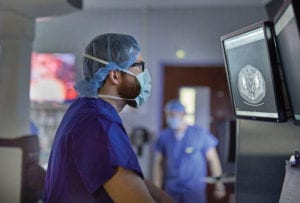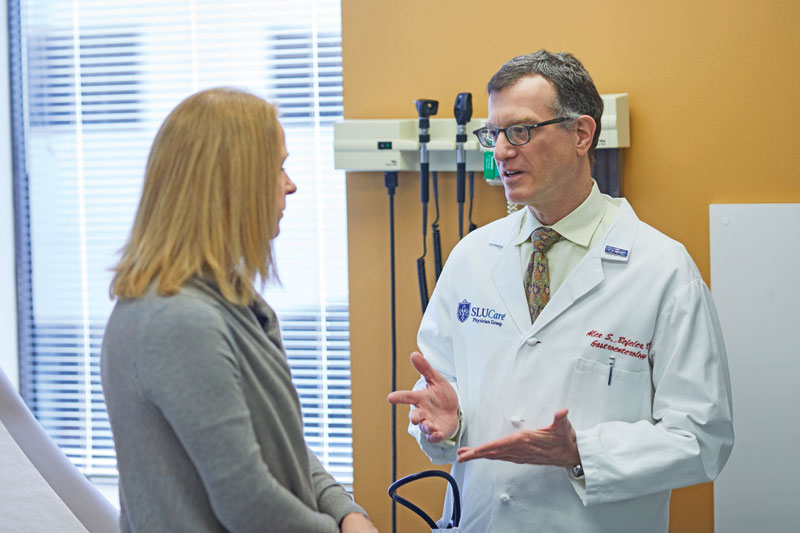
Finding cancer at an early stage can mean the difference between succumbing to the disease and surviving it. That’s a stark but life-saving message SLUCare doctors want to convey to the public, along with the importance of healthy habits and preventive care. They are passionate about using modern technology and patient education to detect cancer early and intervene so people can enjoy longer, healthier lives.
Early awareness is important in treating cancer because it enhances the patient’s choices and chances of success, says Dr. Alex Befeler, SLUCare transplant hepatologist at SSM Health Saint Louis University Hospital. “If you wait until you have symptoms, it’s likely your therapy options will be more limited,” he explains. “But if it is detected early, before symptoms even appear, there are likely to be more curative treatment choices with a high rate of success.”
Befeler says many people may not be aware of the usual progression of liver cancer, but it’s an important process to understand. It can happen when the patient contracts hepatitis C, a viral infection of the liver. This leads to cirrhosis, or scarring, of the organ; later, cancer develops and can spread to other areas of the body. “It may take a number of years for the cancer to appear,” Befeler explains. “If we can diagnose and treat liver disease early and prevent cirrhosis from occurring, we likely can prevent the cancer.”
According to Befeler, baby boomers should get a blood test for hepatitis C as a preventive measure. “If you have hepatitis C, the treatment for it is very effective,” he notes. “It takes two to three months, and we are seeing near 100 percent cures.” The condition rarely causes symptoms, so patients may not even know they have it until they get a cancer diagnosis.
SLUCare urologic oncologist Dr. Zachary Hamilton says sensitive screening methods like the prostate-specific antigen (PSA) blood test are helping doctors get an early handle on prostate cancer, the most common type of solid organ tumor in males. The antigen is a protein that may be elevated in the blood of a patient who has the disease.
“Lifetime risk for this type of cancer is one in every seven or eight men,” says Hamilton, who also practices at SSM Health Saint Louis University Hospital. “Before the early detection methods we have now, patients had a 70 or 80 percent chance of surviving five years after diagnosis. Today, with better screening, it’s more like 95 to 99 percent because we can catch the cancer earlier.” If not treated, prostate cancer can spread to areas like bones and pelvic lymph nodes.
Men age 55 and older who get screened for prostate cancer every year or so have a good chance of detecting the disease at an early stage, Hamilton says. “In some patients, we catch it so early that they don’t even need treatment at that time,” he notes. “We can put them on an active surveillance program that involves periodic tests and imaging, and if the cancer looks like it may become aggressive, we can intervene.”
Hamilton says there also are genetic tests for cancer that show promise in early detection. “These tests can analyze a man’s individual DNA and his hereditary risk for the cancer,” he notes. “The technology is in its early stages in clinical use, but so far, it’s producing exciting results and opportunities.” It’s also possible to analyze the tumor tissue of a patient who has had prostate cancer and determine his risk of recurrence. “This can help guide post-operative treatment and therapy,” he says.
Doctors are making strides in diagnosing and treating patients with testicular, bladder and kidney cancers, too, according to Hamilton. “Identifying blood- and urine-based biomarkers is a promising area of research that can tell us when a gene has been disrupted and there’s an increased risk of cancer,” he says. Biomarkers are measurable indicators like DNA, vital signs or blood chemistry results that may signal disease.
“It’s important to stay informed about different types of cancers and learn whether you need early screening,” Hamilton advises. “Listen to your body, take good care of it, and talk with your doctor to find out which tests are important as you age.”
SLUCare Physician Group is dedicated to providing complete diagnostic care and treatment for cancer patients. Pictured on the cover: SLUCare urologic surgeon Dr. Zachary Hamilton. For more information, call 314.977.4440 or visit slucare.edu.
Cover design by Allie Bronsky
Cover photo courtesy of SLUCare Physician Group
Pictured above: Dr. Alex Befeler consults with a patient.
